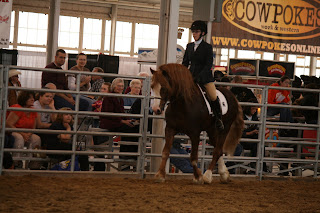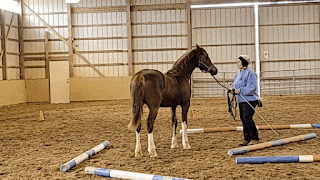Since the clinic a few weeks ago, I've been processing what I learned every time I work with Disco. And some of the advice I've kept, and some of it I've acknowledged before setting it gently off to the side.
 |
| Beginning of April |
On the one hand, I got a lot of good information out of that clinic and have put quite a bit of it to use. Her no-nonsense way to handle him, her insistence that he pay attention to the handler, and the tools she gave me to confidently escalate the situation when I need to earn some respect from him have all paid off handsomely.
Exactly one time since then, we had a bit of a knock-down-drag-out over walking quietly through the gate at turnout, and without what I learned in the clinic, I probably wouldn't have stuck with it for the 30 minutes it ended up taking to get him doing what I asked in the way I wanted him to do it. But I did, and he hasn't challenged me on anything since.
 |
| Middle of April |
Some of her other advice, though, after taking a deep breath and having a long conversation with Lisa about her decades of experience raising and handling Welsh Cob stallions, I'm setting aside. And maybe the clinician will get an "I told you so" out of me on that someday, but maybe she won't.
 |
| Riding Connor's sire, *Tuscani Dundee, in the Hoosier Horse Fair ten years ago yesterday |
The clinician's approach to handling stallions is to handle them impassionately and I'm going to call it coldly. No scritches, never allowing them to walk up to you, treating them like a deadly weapon that might go off at any moment, that kind of thing. Extreme discipline and old broodmare energy at all times.
 |
| Me and baby Echo, 2018 |
And I'm going to sound like a Paralli wingnut for a second, and you're welcome to roll your eyes at me and tell me I'm going to get hurt someday, but I'll own it: My gut says if I treated Disco the way she wants me to treat him all the time, he would end up confused, emotionally isolated and fearful. She doesn't know this breed the way Lisa and I do.
 |
| Me with then two-year-old stallions Castleberrys Reno (Disco's sire) and Castleberrys Echo in 2018 |
I do not think he needs to be my best friend. I do think that this breed thrives on interactions with their people in a deeply fundamental way that drew me to them in the first place, and the stallions are no different.
You do still need to stay one step ahead of them and demand respect, it's true, but I feel that treating Disco with such impassion at this stage in his development would be harmful. And that maybe there's more than one way to raise a good, safe, respectful, well-mannered stallion.
 |
| Connor's stallion full brother, Castleberrys Cadence, last week in Oregon |
So I'm going to be smart about it, I'm going to take the parts of what I learned from her that are great, I'm going to file the rest away, and I'm going to continue to lean heavily on my mentor, Lisa, and take it one day at a time, which has been the plan since the beginning.








































